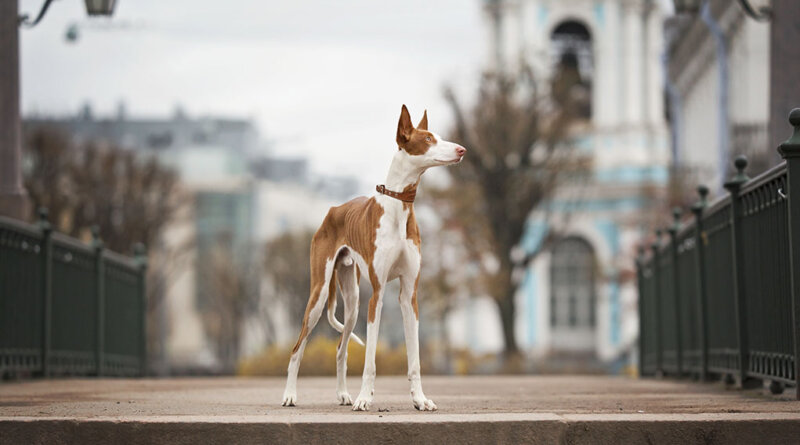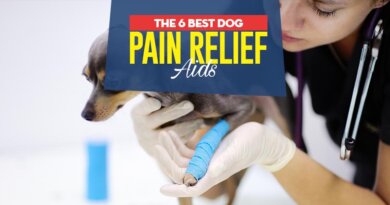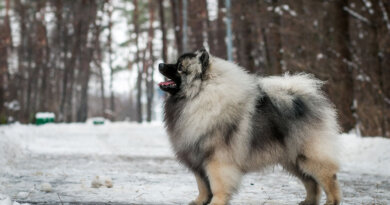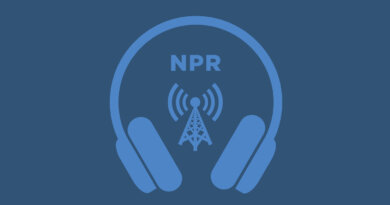Ibizan Hound Dog Breed Profile – Top Dog Tips
Remarkable as the ‘Watchdog of the Dead’, the Ibizan Hound Dog emits the elegance and power of its ancient ancestor Anubis.
Also known as the ‘Beezer’, the Ibizan Hound dog is one of the most exceptional athletic dogs out there.
Their utmost explosive vitality matched with their athletic ability and cleverness makes them a pronounced breed.
If you’re researching Ibizan Hound dogs and puppies because you want to adopt one, you came to the right place!
Let’s take a look at the Ibizan Hound’s background.
Ibizan Hound History
The Ibizan Hound dog, a member of the Hound Dogs was first located on the Balearic Island in Spain.
Brought by the Phoenicians merchants, Ibizan Hound dogs are valued for their tenacious, loyal and nimble characteristics.
Alongside the islanders, Ibizan Hounds were used to chase down meat such as rabbits for meals.
Due to the scarcity of food sources, Ibizan Hounds and their human companions had to feud with survival and hunger to catch rabbit game.
They were used in packs or groups as well.
The Ibizan breed came to the U.S around the mid-1950s. With its small population but prominent presence, the Ibizan Hound dog is a rare breed to be found.
The Ibizan Hound was recognized by the American Kennel Club on the year 1979.
Physical Characteristics
Ibizan Hounds have neat physical traits. With their tall, slim, and muscular stature they manifest elegance and athleticism.
Ibizan Hounds vary in size and weight depending on gender.
Female Ibizan hounds stand 22.5 inches – 26 inches tall, weighing at least 45 pounds.
While male Ibizan Hounds stand at 23.5 inches to 37.5 inches, weighing 50 points at least.
Ibizan Hounds have short hair. Their coat is either smooth or wiry. Ibizan Hounds come in Red, Red & White, White, White & Red. Ibizan Hounds have White markings as well.
Also, they have large round eyes that come in amber or caramel color. Their eyes are positioned on the front-almost side of the face.
Their nose comes in brown to lightly pigmented shade.
Ibizan Hound’s ears are almost like rhombus in shape. They are set in the need for skill, standing tall and thin.
They are rather known for their expressive ears that communicate their emotion humorously.
Ibizan Hound’s head is round in shape and slims down pointed to their muzzle. Their muzzle is quite long and shaped downwards as well.
The neck of the Ibizan Hound is prominently long and thick. It connects well with its muscular upper body.
Their chest isn’t noticeable but it smoothly connects down arching their abdomen.
The back is also straight with their tail facing downwards. Ibizan Hound’s legs are slim and tall.
The forelegs are leveled while the hind legs are set much higher giving them a prim posture.
The temperament of the Ibizan Hound
Speed and the ability to open doors aren’t just things Ibizan Hounds can do! They can be cuddle buddies for their owners too!
Ibizan Hounds are extraordinarily big-hearted toward their owner and family.
Ibizan Hounds are moderately good with children. These pups will need early socialization and exposure to children for them to tolerate them better.
Since children are unpredictable and Ibizan Hounds respond accordingly to threats, it’s best not to leave children unattended with them.
Ibizan Hounds are aloof with strangers. They may need a bit of time to get accustomed to the presence of an unknown person but after meeting them more frequently, they’ll open up eventually.
Ibizan Hounds are notably friendly toward other dogs. Ibizan Hounds like to interact with other dogs.
Their curiosity toward other dogs is fun to witness, especially if Ibizan Hounds were exposed to early socialization when they were younger.
Their friendliness will be more disclosed.
Ibizan Hound dogs are outstanding watchdogs as they have vocal personalities.
When they sense unfamiliar visitors or any threat, they will immediately alarm their owners or family.
Living with an Ibizan Hound
Ibizan Hounds will do amazing with homes that have large yards as they thrive on mobility and openness.
They should be kept inside at home and maybe let out for free time. Ibizan Hounds are not recommended to stay in apartments, studios, or cramped areas.
These dogs are best with owners or families that have an active lifestyle—a life outdoors.
An adventure is the best experience for Ibizan Hounds as they also enjoy spending time doing anything with their owners.
Ibizan Hounds are quite sensitive creatures. They’re very sensitive to their owner’s emotions. Ibizan Hounds have velcro tendencies as well.
If owners plan to leave their homes for more than a couple of hours, they should leave the dog with someone they know instead of leaving them alone.
Ibizan Hounds can become stressed, depressed, and destructive if they are bored and alone for long periods.
Training & Exercise
Ibizan Hounds are remarkably athletic and intelligent. As part of the Hound dog category, their ability to cogitate in problem-solving and speed in hunting is astonishing.
Ibizan Hounds are very comprehensive. They can learn repetitive tasks like opening a gate or door when watched repeatedly.
Ibizan Hounds should have basic training and commands while their young as they can become self-willed.
Mentally stimulating Ibizan Hounds will help develop their social and cognitive skill.
This will also help them bond with their owner and build an owner-companion relationship.
Mentally stimulating activities such as problem-solving, detecting, and searching are best with Ibizan Hounds. Owners can also make this playtime as well.
Ibizan Hounds are exceptionally active. They will need a daily exercise regimen that will release this stamina.
Ibizan Hounds can have a run on an open field or park with a fence for at least 30-40 minutes a day.
Owners can also have their Ibizan Hounds walked for at least 30 minutes to an hour twice a day.
Ibizan Hounds have an excessive amount of energy. If this excessive amount of energy does not have an outlet, Ibizan Hounds can become destructive inside their home.
Health Care of the Ibizan Hound
Ibizan Hounds are quite a healthy breed. They can live from 11 to 14 years of age.
They can live a lifetime without experiencing serious illness or injuries but some Ibizan Hounds may have congenital diseases and possible traumatic injuries.
Here are some common diseases Ibizan Hounds are prone to:
Allergies
Allergies are common in Ibizan Hounds. Ibizan Hounds should be checked with the veterinarian for medication or supplements needed for them.
Remember to have it checked regularly and as soon as possible.
Owners should also ask their veterinarian what causes the allergy and what foods or activities to avoid.
Autoimmune Thyroiditis
Autoimmune Thyroiditis is a hereditary disease. The thyroid gland may produce fewer hormones than needed to function.
Drastic weight change, lethargy, darkening skin pigment, excessive shedding, infertility, obesity, and cold tolerance can be the apparent symptoms.
If your dog is diagnosed with Autoimmune Thyroiditis, it may have another disorder. It is best to thoroughly check it out with the veterinarian.
Having it checked out and tested early by the veterinarian is the key to treatment and prevention.
The veterinarian may give medication that may regulate the hormones.
Axonal Dystrophy
Axonal Dystrophy is swelling of the axons which disrupts their function to deliver messages from nerves to the brain.
This disease affects infants to puppies young in age. Pounds affected with Axonal Dystrophy will experience loss of vision, mobility, and degenerate cognitive function.
Early diagnosis for Axonal Dystrophy is best for dogs like Ibizan Hound. For early prevention and maintenance to prevent lessening their life quality.
Congenital Deafness
Although it isn’t as prevalent with other breeds, deafness is congenital in the Ibizan Hound dog breed.
If the owner suspects their Ibizan Hound is deaf, they should have it checked and tested by their veterinarian.
They will then be able to figure out if it’s bilateral or not and the grade of deafness with their dog.
Disabled dogs may require more assistance but do not mean they will do less for their owners.
It’s important to take care of these creatures more than ever. To anyone’s surprise, these can bring even more soul into your life.
Eye Disease (Cataracts and Retinal Dysplasia)
A cataract is an obstruction of lens fiber in the lens of an eye. the gradual clouding of the lens in the eyes.
Although this is more common in elderly dogs it can also be acquired through genetics, traumatic injuries in the eyes, nutritional deficiencies, or diabetes.
Have your pet get an ophthalmic examination to detect small cataracts as early as they step four to five years old.
To determine whether it is blinding or not, it is better to check with your veterinarian to be informed what procedure should be done.
Options for prevention of this disease are very small as well, proper diet and refraining from exposure to toxins may lessen the risk of cataracts.
Retinal Dysplasia is the abnormal growth of the embryonic retina. This can be congenital or due to trauma or exposure to toxins.
If the symptoms persist, they may detach and result in blindness.
Hip Dysplasia
Hip Dysplasia is a genetic condition wherein the socket of the joint and ball becomes distorted.
When diagnosed with Hip Dysplasia, it’s important to keep their weight within the normal range and have them exercise with activities that promote joint therapy.
Veterinarians may prescribe medications for anti-inflammatory/ pain relievers and supplements.
Prevention is the same—keeping them active but not injuring them as well. A treadmill walk or swimming is perfect for prevention and recovery as well.
Diet Needs
Ibizan Hound dogs are in the medium breed category but due to their slim and tall stature, you may consider them as a part of the large breed.
Ibizan Hounds do not have many restrictions in terms of diet except for those who have allergies.
Adult Ibizan Hound dogs can be given 2-4 cups of high-quality food, split into two meals daily.
Wet food can also be introduced as it promotes hydration. Owners can also mix the dry and wet food for variation.
Home-made meals can also be given but make sure to check which foods are healthy and unhealthy for the dog.
Treats can also be given in moderation and as necessary.
Ibizan Hound Grooming
Ibizan Hounds have a moderate grooming level. Their coat is moth and is either smooth or wiry. Ibizan Hound does not shed as much accordingly they can be groomed monthly.
Although they do not need to be groomed regularly, a grooming regimen may differ depending on what type of coat they have.
Both types of coats can be bathed at most 2-3 times a month. Ibizan Hounds should also be bathed after water or messy activities.
The grime build-up may accumulate to skin infections.
Ibizan Hounds with a smooth type of coat can be brushed once or twice weekly. But it’s best to brush it more frequently to reduce the shed.
While for Ibizan Hounds with a wiry type of coat, hair should be brushed more, especially in the underarm area and behind the ears.
Areas with more fur should also be brushed immediately to prevent matting skin trauma.
Ibizan Hounds should have their ears cleaned at least once a week. Their ears should also be patted dry after a bath.
Ibizan Hounds should have their teeth brushed 4-5 times a week if possible daily.
Ibizan Hounds’ nails should be trimmed twice a month but filed weekly. If the nails touch the floor it’s best to trim or file them.
Ibizan Hounds may become stubborn or impatient during the grooming regimen. It’s best to introduce a grooming routine to them while they’re puppies.
Making a good and calm atmosphere during the regimen will help them relax.
Grooming is best done when they’re worn out from playtime. Owners can also provide some treats and their favorite toys.
Holding their paw, nails, and teeth casually can also help them feel grooming is a normal routine.
Frequently Asked Questions about Ibizan Hounds
Are Ibizan Hound dogs in the large breed category?
Ibizan Hound dogs are in the medium breed category. They may look large due to their slim & tall height but their proportions are for a medium dog breed.
Can I let my Ibizan Hound Dog walk or run without a leash?
Unfortunately, it’s not recommended unless they have been thoroughly trained to return and successfully respond to commands.
Ibizan Hound Dogs have a high prey drive and when they start to chase down small animals, it may be very difficult to stop them altogether and summon them back.
Can Ibizan Hound dogs stay in apartments?
Although it is suggested for Ibizan Hound dogs stay in homes with large spaces, they will do just as well in apartments if given their daily exercise and training needs.
Owners can also bring their Ibizan Hound dogs out for playtime or just about any venture.
Ibizan Hound Dog Breed Profile Summary
If you’re looking for an athletic and loving family dog, the Ibiza Hound dog is the one for you!
This breed offers so multiple skills and entertainment along with some fun-loving personalities. Ibiza Hound dogs are rare for a reason!
Remember to adopt from reputable breeders instead of puppy mills and backyard breeders!
Adopting Ibizan Hound dogs from these areas results in uncertain health issues which affect the quality of life of the dog.
Make sure to have your Ibizan Hound puppies tested immediately after adoption to ensure and address any health implications.
Also, don’t forget to get them treated immediately and get them checked up regularly with their veterinarian.
RELATED: WEIMADOR DOG BREED PROFILE
Related










